“The Rollin' Stones are probably destined to be the biggest group in the R&B scene if it continues to flourish. They aren't the jazzmen who were doing trad 18 months back and who have converted their act to keep up with the times. They are genuine R&B fanatics.”
So said Record Mirror’s Norman Jopling in May 1963 of the band which soon added a “g” to become The Rolling Stones. He went on to point out that “the number of R&B clubs that have [recently] sprung up is nothing short of fantastic.”
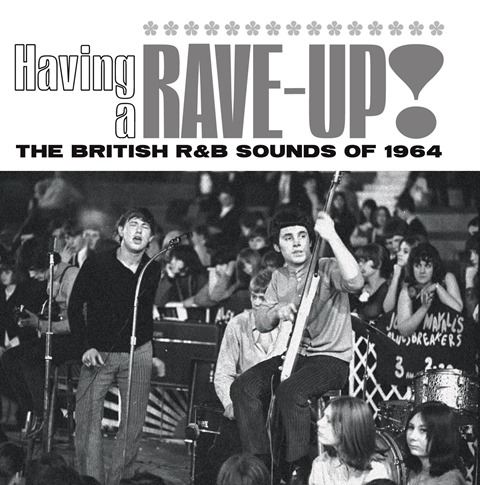 At the year’s end the R&B-smitten Jopling wrote two articles for Record Mirror, each headed 1963: Rhythm And Blues Made The News. He explained the impetus for writing the pieces, which appeared in consecutive December issues. “This has been the year for rhythm and blues fans. There is no doubt about it,” he enthused. “At the beginning of the year the R&B craze hadn't spread outside of a small circle of 'fanatics.’ Now, it's the big thing. Whether or not it will continue to dominate the scene is debatable, but so far it is very, very big.”
At the year’s end the R&B-smitten Jopling wrote two articles for Record Mirror, each headed 1963: Rhythm And Blues Made The News. He explained the impetus for writing the pieces, which appeared in consecutive December issues. “This has been the year for rhythm and blues fans. There is no doubt about it,” he enthused. “At the beginning of the year the R&B craze hadn't spread outside of a small circle of 'fanatics.’ Now, it's the big thing. Whether or not it will continue to dominate the scene is debatable, but so far it is very, very big.”
In his month-by-month round-up of the records issued over the year, just one home-grown release was mentioned amongst the otherwise US-recorded singles which had made their way to the UK. This sole Brit was Cyril Davies, with his “Country Line Special” single. The first two Rolling Stones’ seven-inchers – June 1963’s Chuck Berry cover “Come on” and November’s Lennon and McCartney composed “I Wanna be Your Man” – didn’t make the cut. Perhaps they were now a pop band? Nonetheless, Jopling concluded that “next year [1964] could be an even bigger year record-wise [for R&B] – and the fact that Chuck Berry may well tour here could clinch the boom after the fabulously successful Bo Diddley appearances.” Rhythm and Blues was on the up. And doing so in the year The Beatles and Merseybeat redefined the landscape of British pop.
Jopling’s prediction about 1964 was spot on. The Rolling Stones weren't the only band gettng with the programme. A look at the British charts of that August – 60 years ago this month – finds R&B-fixated outfits The Animals, The Kinks, Manfred Mann and the Stones amongst the best-sellers, rubbing shoulders with Merseyside beat practitioners The Beatles, Gerry and the Pacemakers, Billy J. Kramer, The Merseybeats, The Mojos and The Searchers, as well as less categorisable beat-boom combos The Four Pennies, The Honeycombs, The Nashville Teens and The Zombies. Also on the R&B tip, John Lee Hooker was even in the charts with a UK issue of “Dimples.” Home-grown R&B groups were making their mark.
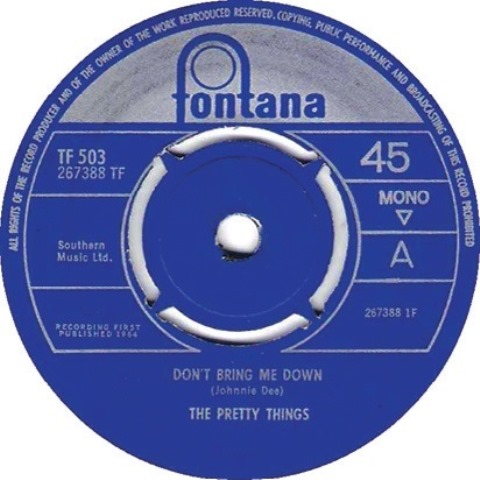 Amongst those surfacing with the rising R&B tide were The Pretty Things, whose first two singles – May 1964’s “Rosalyn” and October’s “Don't Bring me Down” – were prime candidates for the most crude, shaggiest singles to enter the UK charts so far. Setting aside Dave Dee, Dozy, Beaky, Mick & Tich and The Troggs, nothing this reductive would return to charts until the early Seventies glam boom – no coincidence that Bowie’s “Jean Genie” was modelled The Yardbirds' version of Bo Diddley’s “I’m a Man” – and, a few years on, punk. In 1964, home-grown R&B bands could be unpolished yet still get into the Top 40 alongside established popsters like Adam Faith and Billy Fury.
Amongst those surfacing with the rising R&B tide were The Pretty Things, whose first two singles – May 1964’s “Rosalyn” and October’s “Don't Bring me Down” – were prime candidates for the most crude, shaggiest singles to enter the UK charts so far. Setting aside Dave Dee, Dozy, Beaky, Mick & Tich and The Troggs, nothing this reductive would return to charts until the early Seventies glam boom – no coincidence that Bowie’s “Jean Genie” was modelled The Yardbirds' version of Bo Diddley’s “I’m a Man” – and, a few years on, punk. In 1964, home-grown R&B bands could be unpolished yet still get into the Top 40 alongside established popsters like Adam Faith and Billy Fury.
Dedicated to this boom year, the three-CD, 91-track clamshell box set Having a Rave-Up! - The British R&B Sounds of 1964 digs deeply into exactly what its title says. It begins with The Pretty Things’ “Rosalyn,” and ends with a sandpaper-scratchy version of “Long Tall Shorty” by a band called The End, about whom nothing is known (they were, though, not the Bill Wyman-managed The End).
Although The Rolling Stones and Them are absent from the tracklisting, the other R&B-rooted hitmakers are here: The Kinks, Manfred Mann, the (pre-hit) Spencer Davis Group and The (also pre-hit) Yardbirds. Scene mainstays too: Long John Baldry & The Hoochie Coochie Men, The Birds, Bo Street Runners, Downliners Sect, The High Numbers (the soon-to-be Who), John Mayall & The Blues Breakers, Zoot Money and pre-Artwoods outfit The Art Wood Combo. Even though Graham Bond and Georgie Fame are compiled, the main focus is on the coarser end of things, rather than the jazz and soul flavours favoured by the crowds at London's Flamingo Club. There are also groups where R&B was part of their repertoire rather than their raison d'être: The Dennisons, The Merseybeats, The Searchers, The Toggery Five.
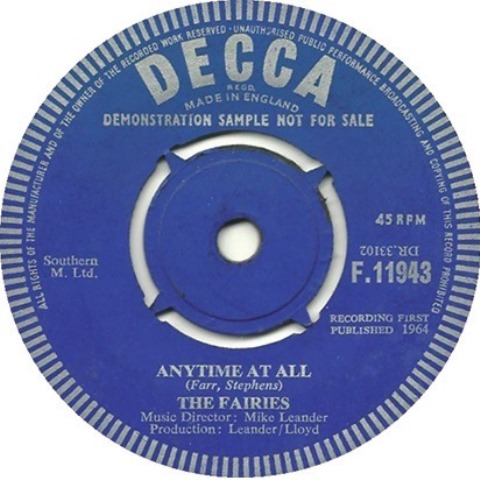 Overall, Having a Rave-Up! – with its Yardbirds-referencing title – is dizzying. Presaging punk, musical finesse didn't matter. Suddenly, the British music business accommodated a band with zero commercial potential like the shaggy Fairies, whose Pretty Things-derived "Anytime at All" sounds like they had chucked their instruments down a stairwell. Also here are many obscurities by barely known groups like The Excerts, Lester Square & The G. T.'s and The SW4, all of whom had less of a chance than The Fairies.
Overall, Having a Rave-Up! – with its Yardbirds-referencing title – is dizzying. Presaging punk, musical finesse didn't matter. Suddenly, the British music business accommodated a band with zero commercial potential like the shaggy Fairies, whose Pretty Things-derived "Anytime at All" sounds like they had chucked their instruments down a stairwell. Also here are many obscurities by barely known groups like The Excerts, Lester Square & The G. T.'s and The SW4, all of whom had less of a chance than The Fairies.
One band which was very active on the London scene was The Tridents, who never made a record. Their guitarist was Jeff Beck. They did, though, record some demos – two of which ended up on the 1992 Jeff Beck box set Beckology alongside a live cut which was credited as having been recorded at Eel Pie Island in April 1964: as Beck didn’t join the band until September 1964, the box-set date was wrong – and they didn’t play Eel Pie Island until that month. Having a Rave-Up! includes the extraordinary wig-lifter “Tiger in Your Tank,” a live recording of The Tridents made by the BBC at Eel Pie Island for subsequent broadcast in Germany which is dated to 25 October 1964. Beck spends most of the performance playing the spiralling lines which would characterise his early recordings with The Yardbirds, who he left The Tridents for in March 1965. The track has never been issued before, although it was first heard via the internet about four years ago. Given that this is the earliest recording of Jeff Beck to surface, it is historic. It also helps that it’s terrific.
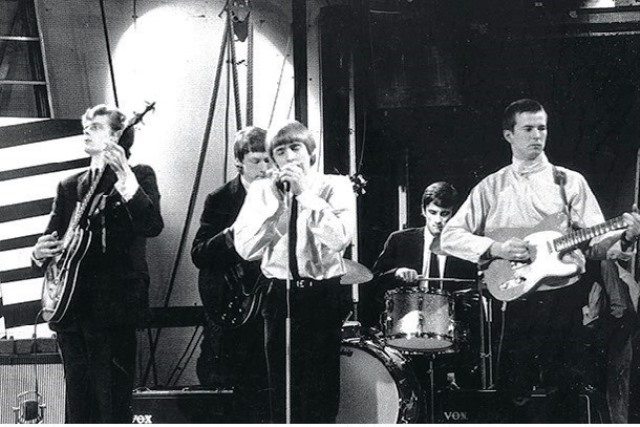 The explosive “Tiger in Your Tank” and Beck’s onward trajectory raise the question of how far the 1964 R&B boom could go, and where it could go. British R&B saturation point had been reached. For The Yardbirds – whose Clapton era features on Having a Rave-Up! – it was towards pop and, in time, a thrillingly exploratory music. Clapton wanted to stick with blues so went off in a huff. Beck, his replacement, had no problem stretching out. (Pictured left, The Yardbirds in 1964 with Eric Clapton, right, in their line-up)
The explosive “Tiger in Your Tank” and Beck’s onward trajectory raise the question of how far the 1964 R&B boom could go, and where it could go. British R&B saturation point had been reached. For The Yardbirds – whose Clapton era features on Having a Rave-Up! – it was towards pop and, in time, a thrillingly exploratory music. Clapton wanted to stick with blues so went off in a huff. Beck, his replacement, had no problem stretching out. (Pictured left, The Yardbirds in 1964 with Eric Clapton, right, in their line-up)
As the Yardbirds showed, different bands would take different directions as they left formal R&B templates behind. When The Rolling Stones began writing their own songs, R&B informed what they did but it became one aspect of who they were. A single-notion band like The Fairies could only go so far and their final single was issued in July 1965. Their inspiration, The Pretty Things, pushed forward, becoming ever-more unusual – as evidenced by their moody December 1965 single “Midnight to Six Man.” While 1964 was the peak year for heads-down, no-nonsense R&B in the UK, it was also the year which showed that, for now, there were limits to this particular form of tunnel vision. Fast forward to the late Sixties though, and the British blues boom would rear its head.
Having a Rave-Up! is maximum R&B fun, but there are a few hiccups. Barring three tracks, everything is mono as it would have been in 1964. The Hollies’ version of "Memphis Tennessee" is in stereo, and presumably comes from an album master. Manfred Mann’s “I’m Your Kingpin" is also stereo. In this case, as it was a mono single and album track in the UK this might be from the 1965 US album The Five Faces Of Manfred Mann which was issued in mono and stereo. More problematic is the version of The Pirates “Castin' my Spell” which is very widescreen stereo, possibly reprocessed (i.e. mono which jiggery pokery has turned into stereo). Heard amongst their mono brethren, these stereo tracks jar. Nonetheless, Having a Rave-Up! - The British R&B Sounds of 1964 is a wonderful compendium of the year British pop’s hopefuls went mad for rhythm and blues.
- Next week: Finnish 1980s/1990s post-punk outfit Shadowplay
- More reissue reviews on theartsdesk
- Kieron Tyler’s website

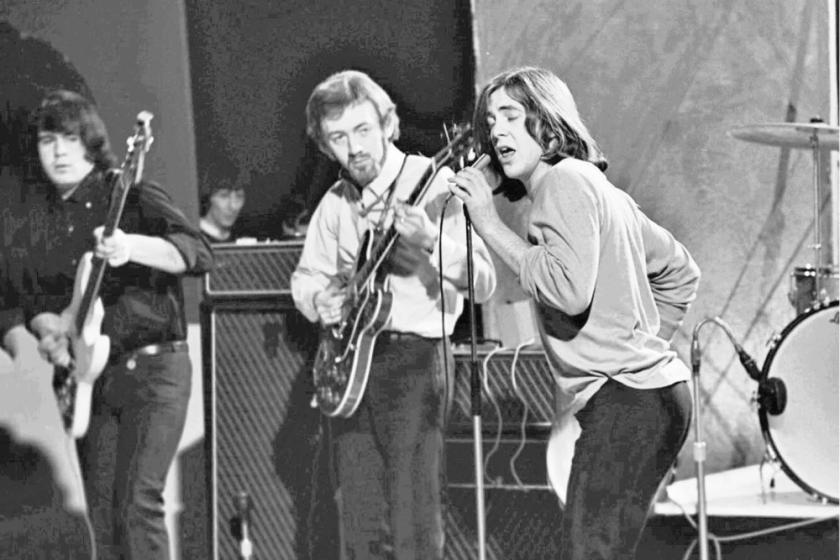

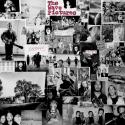











Add comment